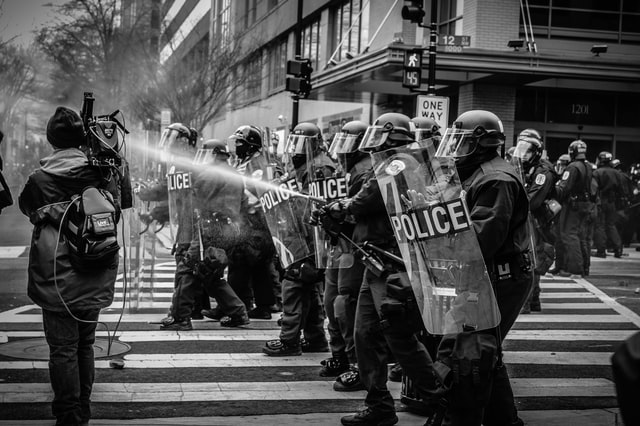During The International Risk Podcast discussion with Will Clapton, the topic of anticipatory self-defence was discussed. International self-defence is complex, but the prohibition of the use of force, has remained clear and undeniable since 1945. Customary International Law (CIL) right to anticipatory self-defence no longer exists in the UN era and cannot be justified as a permissible use of force under Article 51 of the United Nations Charter (herein referred to as ‘Art. 51’). This will be examined in relation to ongoing terrorist activities and recent developments in international law. It is important from the outset to make clear that anticipatory self-defence refers to the ‘resort to force in self-defence before an armed attack has commenced.’
The UN Charter, which has now been in effect for over 60 years, there is no justification for pre-emptive or anticipatory self-defence. It is worth acknowledging that the application of CIL, and in particular anticipatory self-defence, has failed to be applied consistently and remains a contentious issue today.

In the wake of the 11 September terror attacks in the US, Security Council Resolution 1373 (2001) called on states to ‘prevent and suppress the financing of terrorism’ and also for states to ‘refrain from providing any form of support to entities or persons involved in terrorist acts’, prevent terrorism from their citizens, deny refuge or safe passage of terrorists through or on their territory. This resolution whilst predicable in its desire for the cessation of support provided to terrorists, it is purely a reactive counter-terrorism measure that fails to address the causal factors of terrorism.
To address the deepest causes of conflict, governments must address economic despair, social injustice, and political oppression. It is possible to discern an increasingly common moral perception that spans the world’s nations and peoples, and which is finding expression in international law. The solutions to these problems exist in commitment to human rights.
The modern use of force
The use of force is governed today by the UN Charter, which was the framework for the organisation and its member-states, which were attempting to secure peace after the destructive periods of war during the first half of the 20th Century. In particular, Article 2(4) of the UN Charter (herein referred to as ‘Art. 2(4)’) requires members to refrain from threatening or using force against another state. If such force is used, the UN Charter authorises the military use of reactionary force in the form of self-defence in accordance with Art. 51 of the UN Charter. This paper will consider Art. 51 in more detail, but first it is essential to review Art. 2(4) and appreciate its significance. Art. 2(4), which is recognised as having jus cogens status in CIL, governs the use of force by UN members. It expressly forbids states from using force against any other state, with two exceptions; UN Security Council decisions made in the interests of international peace and security; and acts of self-defence.
It is evident that it is a ‘fundamental right of a state… to defend itself from attack. Self-defence whilst an innate right, is not necessarily an autonomous right; defined and limited by Art. 51. This is illustrated by Security Council Resolution 487 (1981), which strongly condemned the Israeli attack on an Iraqi facility located within Iraqi sovereign territory in June of the same year. The Resolution noted that the attack by Israel was in ‘clear violation of the Charter and the norms of international conduct.’ The debate and conjecture surrounding Art. 51’s wording and the requirement for ‘an armed attack’ to occur for self-defence to not be in breach of Art. 2(4) is ongoing. Some scholars correctly argue that the wording of Art. 51 indicates that an armed attack must occur before self-defence is justifiable.
Perhaps the best way to determine if and when self-defence is appropriate is to remember the intention of the UN Charter drafters of Art. 51, to end ‘the illegal situation posed by the [original] armed attack.’ For defence against armed attack to be considered lawful, it is generally required to be necessary, proportionate and in response to an immediate action. Schmitt illustrates the practicality of Art. 51 using the example of the Israeli actions in Southern Lebanon in 2006; ‘the issue of whether Israel could act in self-defence against a non-state actor like Hezbollah, the prevailing view was that it could so long as the necessity, proportionality and immediacy criteria were respected.’

Anticipatory self-defence will always be a weak defence against a charge of illegal use of force, breaching Art. 2(4). The lack of transparency surrounding the justification and evidence for anticipatory self-defence means that any associated actions cannot be judged objectively against necessity, proportionality and certainly against potential immediacy. How can the reasonableness of a state’s action, that are claimed to be defensive in nature, be measured and benchmarked against the pursuit of international security and peace. As argued by Simpson, ‘we need good law, but we also need access to facts.’
Use of force and terrorism
Terrorism is the use or threat of violence, a method of combat or strategy to achieve certain goals, that its aim is to induce a state of fear in the victim, that it is ruthless and does not conform to humanitarian norms, and that publicity is an essential factor in terrorist activity.
Today, there is still an ‘absence of a single definition of terrorism in either customary or conventional international law.’ The reason for a lack of concise and internationally agreed upon definition of terrorism is multifaceted; it is a concept that is persistently evolving; potentially subjective in nature; and if not properly defined, susceptible to being used against the innocent by those of ill-repute.
Terrorism is generally considered, in a broad sense, to include the targeting or threatened targeting of civilians, with the intention of influencing a population, group or government into taking a certain course of action favourable to the perpetrators. Terrorists can, and do, operate on either a domestic, regional or international level. The ability and necessity for some terrorist organisations to conduct their operations on a transnational scale has taken their actions from the realm of the domestic criminal jurisdiction to that overseen by international law.
It must be considered then if a state is defending itself against the armed attack of a terrorist organisation, can it do so pursuant to Art. 51. Schmitt argues that the internationally accepted principle of self-defence is applicable to ‘armed attacks by non-state actors.’ He believes that the text of Art. 51 intentionally leaves open who the purveyor of ‘armed attacks’ be; whether it be state or non-state actors. This paper contends that terrorists do form part of the international community and are applicable and responsible to CIL. As such, it is further contended that a state may apply the principles of Art. 51 when defending itself against the actions of terrorists.
The Use of Force Against Terrorists in the International Arena
Acts of terror are not single isolated incidents of illegal activity. In the preparation and conduct of such acts, terrorists participate in drug, arms trafficking, sexual exploitation, and other international crimes. It is thus necessary to have detailed and comprehensive laws that can be applied internationally against those who commit and participate in such crimes. Annan argues that,
The United Nations is uniquely positioned to advance this effort. It provides the forum necessary for building a universal coalition and can ensure global legitimacy for the long-term response to terrorism.

While Annan further contended that the UN ‘Conventions already provide a legal framework for many of the steps that must be taken to eradicate terrorism’, others have argued that, ‘the inconsistent international legal system fails to deter terrorist operations.’ Perhaps it is not so much a case of lacking internationally suitable laws, but a lack of political will, that is the problem in deterring terrorist actions.
The UN has encouraged states to ‘establish [terrorist acts] as serious criminal offences in domestic laws.’ The international community must consider the transnationality of terrorism and the international cooperation that is required to investigate and prosecute such crimes. Questions of jurisdiction, sovereignty, diplomacy and responsibility must and should be considered by the international legal community to ensure a consistent, fair and effective method of law enforcement. Several UN Security Council Resolutions acknowledge the importance of ‘subregional, regional and international efforts to strengthen the global response’ to terrorism and similarly makes calls for all states to increase their cooperation in order to combat these crimes. Domestic laws alone cannot adequately deal with the complex issues surrounding transnational terrorist organisations that may support and direct members across the globe, and who commit and conspire to commit illegal actions in multiple states. If terrorism is to be addressed, the laws surrounding these crimes must be simultaneously internationalised and localised. An improved international-domestic synergy in the legal battle against transnational crime ensures consistency, transparency and efficiency.
To minimise the current maelstrom of debate surrounding the trials and treatment of terror suspects, it is important to consider and account for potential contingencies. We need to analyse the past while looking forward to the future to help determine how best to counter the scourge of terrorism. A consistent and carefully compiled legal framework, that operates at the international and domestic level is needed to assist the international community combat terrorism. In the interim, however, political favoritism and rhetoric must not get in the way of complying with Security Council Resolution 1373 and its requests for ‘increased cooperation and full implementation of relevant international conventions relating to terrorism.’
Pacta Sunt Servanda
Until such international law can be agreed upon and ratified by all states, it is important that all states comply with existing CIL. As stated in the Vienna Convention on the Law of Treaties, it is incumbent on all states to refrain from committing acts that it is obliged not to commit as a signatory and ratifier of such treaty. This paper argues that the UN Charter is such a treaty, falling within the definition of a treaty.
The Vienna Convention on the Law of Treaties makes it abundantly clear that not only should a treaty be interpreted in good faith ‘in light of its object and purpose’, but it should be done so with due consideration of any relevant and applicable international law. This paper thus suggests that a ruling made by the International Court of Justice regarding the interaction of states would be relevant to any subsequent interpretation of the UN Charter. The Nicaragua Case provides just such an example, where the prohibition on the use of force in accordance with Art. 2(4) has been further strengthened.
The answer lies in the law, not outside it
Although an updated and internationally agreed upon, enforceable and enforced legal framework, that sufficiently safeguards the rights and dignities applicable to all persons; that simultaneously recognises the responsibilities of all people; whilst facilitating the punishment of those conducting, or deterring those who are considering conducting, such heinous acts of terrorism, is needed, at the moment, and as discussed during our podcast, we must temporarily resign ourselves to the laborious and slow methods of education, enforcement and dialogue. If we are to succeed in this battle against terrorism, we must resist the temptation to ignore or bypass CIL. We must not see any and all means as appropriate; we must follow and adhere to whatever CIL is available to us, albeit unsatisfactory as it may be at the moment, for to do otherwise, would make us no better than the adversary we seek to defeat and the risks we wish to mitigate.
